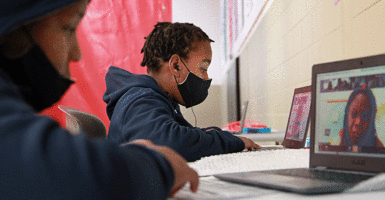Learning hasn’t been easy for Ayana Osborne’s family, who became homeless in December 2019. Mandatory school closures due to COVID-19 meant that her three children enrolled in D.C. public schools spent the spring semester trying to attend their virtual education on the two public computers in a hotel lobby.
As D.C. schools began the fall semester virtually, Osborne struggled to supervise her children during their classes (per homeless shelter regulations) and complete her family’s peer support certification, which is the gateway to her future employment.
>>> What’s the best way for America to reopen and return to business? The National Coronavirus Recovery Commission, a project of The Heritage Foundation, assembled America’s top thinkers to figure that out. So far, it has made more than 260 recommendations. Learn more here.
Talking to The 74 last month, Osborne had this to say about D.C. public schools’ rollout of virtual learning: “At the end of the day, barriers are being created, just to take care of simple needs.”
However, with some forward thinking and ingenuity, nonprofits and other community organizations in Cleveland and San Antonio have created in-person learning environments for at-risk students, and are finding ways to bring much-needed normality and a scheduled structure to children’s education.
This response from civil society can be the lifeline for the many low-income families, like the Osbornes, struggling to balance work and their children’s at-home education.
At the forefront of this unique response has been the United Way of Greater Cleveland and the Cleveland Foundation, which partnered with 25 other nonprofits to open over 50 learning centers across the city for at-risk students to take online classes in a safe, supervised space where children can get meals, receive help with school work, and access their online classrooms at these learning centers.
These partnerships have allowed churches, theaters, and other community venues to open up their doors and use their space to help fulfill an important need for some of the students most impacted by the pandemic.
In San Antonio, Catholic Charities provides a free learning space for families living in the city’s most impoverished neighborhoods. There, students can attend online classes, have reliable internet, receive homework help, and get snacks and meals—all while socially distancing.
These learning centers provide a designated place for supervised learning to help students avoid the potentially devastating effects of COVID-19-related learning loss.
A new study from the National Bureau of Economic Research shows that having even lightly trained tutors available results in substantial positive effects on students’ academic gains.
The learning centers sponsored by nonprofits are a superb example of civil society innovating and supporting communities in a time of crisis. These centers are offering in-person instruction to students who are most likely to fall behind academically from their public school’s online learning program.
With as many as 6 in 10 students living in “remote-only” school districts this fall, local communities need to devise new approaches, like those in Cleveland and San Antonio, to help at-risk children receive education support.
Sponsored learning centers could be an effective homegrown solution to ameliorate the decline in student learning. Last May, Brookings reported that the loss of face-to-face instruction would likely result in adverse effects on student achievement in reading and mathematics, compounded with the unprecedented effects of “isolation, anxiety about a deadly virus, and uncertainty about the future,” for students.
As the National Coronavirus Recovery Commission noted, “The pandemic has underscored the economic and opportunity costs of overregulation and the folly of looking to Washington, rather than to our robust civil society, for solutions to our most pressing problems.”
The current inefficiencies of a pandemic-induced “virtual” public school system highlight the need for education alternatives for all families. Used effectively, learning centers initiated by the community could be a key tool in mitigating pandemic-related learning losses among the most vulnerable students.
Accordingly, policymakers should not impose unnecessary barriers to creating or maintaining educational alternatives. Currently, the overregulation of the education arena prevents too many children from learning in an environment that is best for them.
Homegrown and community-sponsored learning centers are civil society’s innovative solution in these unprecedented times.
Whether through a direct sponsorship of a student or the donation of a space for students to learn, any community member can take charge and support students receiving a quality education.































